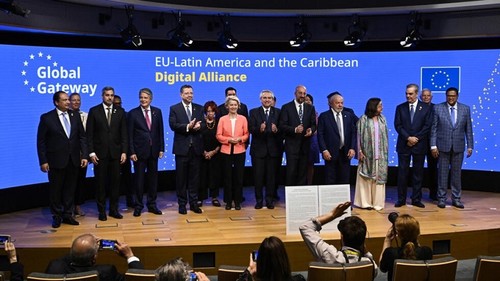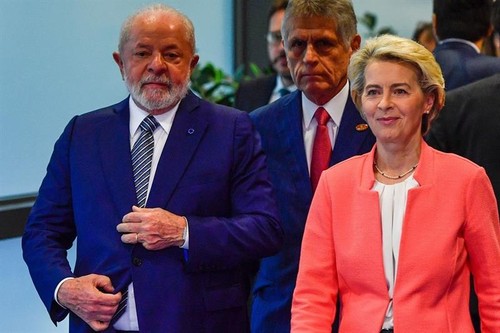 Leaders of European, Latin American, and Caribbean countries attend the EU-CELAC in Brussels, Belgium, on July 17, 2023. (Photo: Jean-Christophe Verhaegen/AFP) Leaders of European, Latin American, and Caribbean countries attend the EU-CELAC in Brussels, Belgium, on July 17, 2023. (Photo: Jean-Christophe Verhaegen/AFP) |
Europe, Latin America, and the Caribbean have a longstanding partnership based on shared values and commitments to democracy, respect for human rights, and the rule of law. They account for one-third of UN members and are the forces of powerful multilateral systems. The two regions share a common vision of protecting the environment and the planet.
Shared vision of the EU, Latin America, and Caribbean
Established in 2010, CELAC consists of 33 Latin American and Caribbean countries, who aim to strengthen political dialogue, cultural and social integration, quality of life, and economic growth. The first EU-CELAC Summit took place in Santiago, Chile, in 2013, focusing on trade cooperation and quality investment in social and environmental sectors.
At the second summit in Brussels in 2015, leaders agreed to work together for a more prosperous, cohesive, and inclusive society.
After eight years of suspension, the third EU-CELAC Summit is taking place in the context that Latin America and the Caribbean are emerging markets that attract a lot of foreign direct investment. The Summit is expected to begin a new relationship based on shared values, and promote cooperation and mutual development.
Latin America and the Caribbean have resources Europe needs, and they need the EU’s technological expertise to more effectively exploit their natural resources. Ahead of the ongoing Summit, the EU's High Representative for Foreign and Security Policy Josep Borrell said that the EU and CELAC have the same will toward future goals. He called on the countries of the two blocs to support each other in dealing with global problems.
 EC President Ursula von der Leyen (R) and Brazilian President Lula da Silva (L) walked in the EU headquarters in Brussels on July 7, 2023. (Photo: AFP) EC President Ursula von der Leyen (R) and Brazilian President Lula da Silva (L) walked in the EU headquarters in Brussels on July 7, 2023. (Photo: AFP) |
Toward a sustainable future
The Economic Commission for Latin America and the Caribbean (CEPAL) said that FDI in this region increased 55% last year to a record 224.6 billion USD. The EU (excluding the Netherlands and Luxembourg) accounted for 17% of foreign investment. Last year, trade revenue between the EU and Latin America and the Caribbean totaled 300 billion USD.
As the leading foreign investor in Latin America and the Caribbean, the EU is operating an investment project worth about 10 billion euro until 2027. This is an international investment within the framework of the Global Gateway program initiated by the European Commission to provide about 300 billion euros for sustainable development projects globally, mainly green transformation and digital transformation.
EC President Ursula von der Leyen said the EU will double its investment in projects for sustainable development in Latin America, focusing on sustainable forest management, renewable energy development, and clean energy infrastructure.
Although cooperation is the focus of the relationship, there are disagreements between the EU and the MERCOSUR, the world's fifth largest economic bloc, which comprises Brazil, Argentina, Uruguay, and Paraguay.
The two sides created a framework for a Free Trade Agreement in 2019 after two decades of negotiations, but that document has not yet been ratified due to the EU’s concerns about Amazon deforestation.
Some European countries with strong agricultural sectors, especially France, do not want to open their markets to agricultural products from MERCOSUR. Therefore, one of the key tasks of the third EU-CELAC Summit is to pave the way for the EU-MERCOSUR Free Trade Agreement to take effect.
Despite differences, the leaders of CELAC and the EU believe the Summit will reach important decisions about creating a favorable environment for expanding cooperation and dealing with global challenges.